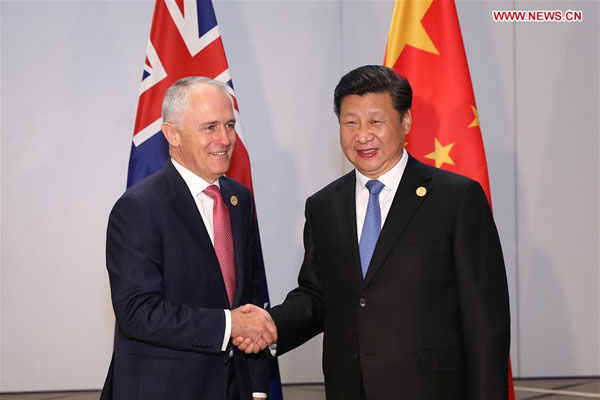China, Australia agree to step up cooperation
(Xinhua) Updated: 2015-11-16 23:50
 |
|
Chinese President Xi Jinping (R) shakes hands with Australian Prime Minister Malcolm Turnbull during their meeting in Antalya, Turkey, Nov. 16, 2015. [Xinhua/Pang Xinglei] |
ANTALYA, Turkey -- China and Australia on Monday agreed to beef up exchanges and cooperation in various areas as leaders of the two countries met on the sidelines of the ongoing Group of Twenty (G20) summit in Turkey.
Both situated in the Asia-Pacific region, China and Australia share important interests and broad space for cooperation, Chinese President Xi Jinping told Australian Prime Minister Malcolm Turnbull.
"We stand ready to work with Australia, on the basis of mutual trust and benefits, to deepen friendly exchanges and practical cooperation in all fields and promote the healthy and steady development of China-Australia comprehensive strategic partnership," Xi said.
The president proposed that the two countries carry out closer high-level exchanges, strengthen communication and promote mutual trust.
The two sides should push for the early entry into force of the China-Australia Free Trade Agreement (ChAFTA), which was signed in mid-June, Xi said.
The trade deal was reached after decade-long talks that began in 2005. The process was greatly accelerated after Xi paid a state visit to Australia in November last year and brought about the signing of the Declaration of Intent.
China is willing to align its Belt and Road initiative with Australia' s northern development plan, and encourage Chinese companies to participate in infrastructure construction in northern Australia, the president said, adding that China hopes Australia can provide a fair environment for investment.
The Belt and Road initiative refers to the Silk Road Economic Belt and the 21st-Century Maritime Silk Road, international trade and infrastructure projects proposed by President Xi when he visited Central Asia and Southeast Asia in September and October of 2013.
Xi also urged the two countries to carry out closer defense cooperation, jointly combat corruption, and strengthen communication and coordination within multilateral frameworks such as the UN, G20 and APEC.
Turnbull, who took office in mid-September, hailed the sound development of bilateral comprehensive strategic partnership and said Australia is willing to deepen high-level exchanges with China, and all political parties in Australia are committed to building a strong relationship with China.
He believes that the ChAFTA, which has just been ratified by the Australian parliament, will lift the economic and trade cooperation between the two countries to new height.
Australia pays high attention to China's 13th five-year plan (2016-2020) for the country's economic and social development, the prime minister said, and looks forward to more opportunities for cooperation with China in innovative development, urbanization and other fields.
Turnbull also expressed support for China in hosting next year's G20 summit.
China and Australia have enjoyed increasingly closer economic ties after forging diplomatic relations over four decades ago. China is now Australia's largest trading partner, export market and source of imports.
Two-way trade grew to $136.9 billion last year, 16 times that of the year of 2000. Chinese businesses have invested nearly $75 billion in Australia by 2014, making it the second largest investment destination only after Hong Kong.




